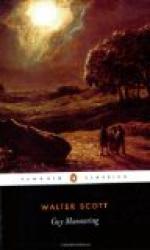As, therefore, it seemed tolerably certain that the men on board the lugger had escaped, the death of Kennedy, if he fell in with them in the woods, when irritated by the loss of their vessel and by the share he had in it, was easily to be accounted for. And it was not improbable that to such brutal tempers, rendered desperate by their own circumstances, even the murder of the child, against whose father, as having become suddenly active in the prosecution of smugglers, Hatteraick was known to have uttered deep threats, would not appear a very heinous crime.
Against this hypothesis it was urged that a crew of fifteen or twenty men could not have lain hidden upon the coast, when so close a search took place immediately after the destruction of their vessel; or, at least, that if they had hid themselves in the woods, their boats must have been seen on the beach; that in such precarious circumstances, and when all retreat must have seemed difficult if not impossible, it was not to be thought that they would have all united to commit a useless murder for the mere sake of revenge. Those who held this opinion supposed either that the boats of the lugger had stood out to sea without being observed by those who were intent upon gazing at the burning vessel, and so gained safe distance before the sloop got round the headland; or else that, the boats being staved or destroyed by the fire of the Shark during the chase, the crew had obstinately determined to perish with the vessel. What gave some countenance to this supposed act of desperation was, that neither Dirk Hatteraick nor any of his sailors, all well-known men in the fair trade, were again seen upon that coast, or heard of in the Isle of Man, where strict inquiry was made. On the other hand, only one dead body, apparently that of a seaman killed by a cannon-shot, drifted ashore. So all that could be done was to register the names, description, and appearance of the individuals belonging to the ship’s company, and offer a reward for the apprehension of them, or any one of them, extending also to any person, not the actual murderer, who should give evidence tending to convict those who had murdered Francis Kennedy.
Another opinion, which was also plausibly supported, went to charge this horrid crime upon the late tenants of Derncleugh. They were known to have resented highly the conduct of the Laird of Ellangowan towards them, and to have used threatening expressions, which every one supposed them capable of carrying into effect. The kidnapping the child was a crime much more consistent with their habits than with those of smugglers, and his temporary guardian might have fallen in an attempt to protect him. Besides, it was remembered that Kennedy had been an active agent, two or three days before, in the forcible expulsion of these people from Derncleugh, and that harsh and menacing language had been exchanged between him and some of the Egyptian patriarchs on that memorable occasion.




